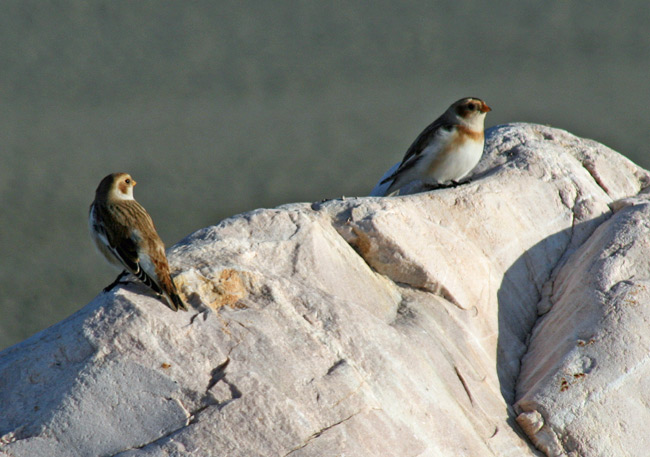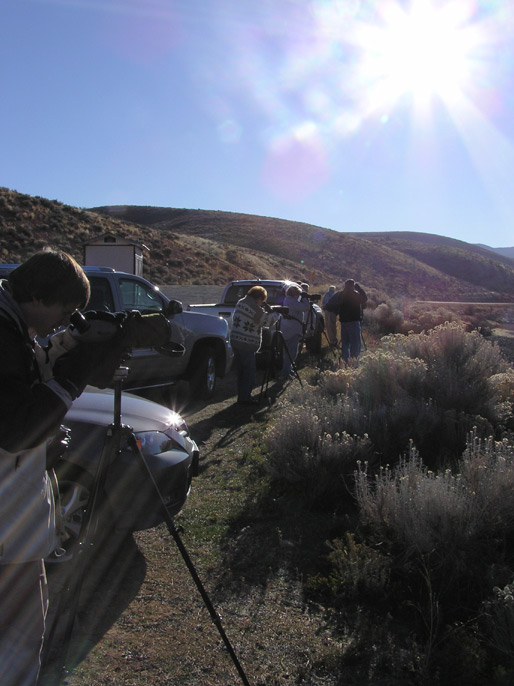Utah County Birders Newsletter
|
 |
|
Snow Buntings - photo by Keeli Marvel |
Bird of the Month
Snow Bunting
Plectrophenax nivalis
by Keeli Marvel
This month’s bird of the month is the Snow Bunting. I chose to highlight this
bird because of the chance (hopefully) many of us have gotten recently to see
one up close, and somewhat closer to home at Lincoln Beach. While we
unfortunately do not get a chance to see the full breeding plumage here in Utah,
I think this bird is beautiful and unique in breeding and non-breeding plumage
alike.
The Snow Bunting is classified in the Emberizidae family that includes other
groups such as sparrows and longspurs. It is one of the few buntings that occur
here in the U.S., and the only one that is observed fairly regularly here in
Utah, with the bulk of the other bunting species occurring across the Eurasian
continent. The Snow Bunting’s wintering habit stretches across the northern
United States (including the northern part of our state) and up through Canada.
Their breeding range is from Alaska east to Greenland and Iceland, with a good
portion of it occurring well above the Arctic Circle.
Because of their harsh habitat, Snow Buntings have adapted to survive subzero
temperatures as low as fifty-eight degrees below zero using adaptations such as
tunneling under the snow in grass or shrub patches in order to keep warm. They
have been observed to bathe in the snow, and are fairly opportunistic in their
food selection. Their preferred habitat is dry tundra, rocky shores (like Utah
lake and the Great Salt Lake), grassy or stubble fields or sand dunes, and
coastal shores where they forage on the ground for things like seeds, insects,
and caterpillars. Coastal birds have even been observed taking small crustaceans
and mollusks.
The breeding coloration of the Snow Bunting is also likely another adaptation to
their snowy breeding habitat. During breeding season they lose all color except
black on their backs and wings and may appear completely white when seen in
flight from below, like a very large snowflake flitting across the sky. Snow
Buntings are monogamous and the males set up and compete for the best breeding
territory weeks before the females return from their wintering grounds. They
build cozy nests nestled far back in rock cracks and crevices and line them with
feathers and fur to keep the eggs warm. The female stays on the eggs almost
constantly to keep them warm, and relies on the male to feed her for the entire
two weeks the eggs are incubating.
One thing I found really interesting about Snow Buntings was the way they
developed their breeding plumage. At the end of the summer, the males molt and
have the brownish black backs streaked and spotted with cinnamon on their sides
and face. However, underneath the colored feather tips, their back feather are
pure black and the body feathers are all white (regardless of the color on top).
The males develop their bold black and white breeding plumage as their feather
tips wear off, and will actively rub them on the snow until the bright white and
jet black feathers are all that are left just in time for breeding season to
begin.
I’ve only been able to see a Snow Buntings a total of two times, the first time,
I spotted a pair last winter hopping around on the rocks next to one of the
bridges on the Antelope Island Causeway, and once this winter again hopping
around the north jetty rocks at Lincoln Beach. I really enjoyed learning about
the unique attributes of this species, and hope you all get a chance to see at
least one this winter!
Sources:
Smithsonian Birds of North America, by Fred J. Alsop III
National Audubon Society The Sibley Guide to Birds, by David Allen Sibley
Cornell Lab of Ornithology All About Birds: Snow Buntings webpage found at
http://www.birds.cornell.edu/AllAboutBirds/BirdGuide/Snow_Bunting_dtl.html#sound
 |
|
Utah County Birders at East Canyon -
15 Nov 2008 |
November Loon Loop - 15 November 2008
Trip Report by Lu Giddings - led by Lu Giddings
A UCB field trip to Deer Creek reservoir, East Canyon reservoir, and Antelope
Island Causeway was held today. It was a beautiful day to be out birding. A bit
cold in the morning, but by afternoon things were lovely.
Trip highlights include:
- Bald Eagles at Deer Creek reservoir, East Canyon reservoir, over the freeway
as we drove through north Layton, and Antelope Island Causeway.
- Barrow's Goldeneyes and Hooded Mergansers near the inlet end of East Canyon.
- It was amazing to see how few birds were frequenting the usually teeming
waters at the Big Bridge on the causeway. However, over the course of roughly 90
minutes, we spotted a female black scoter, a female long-tailed duck, and what I
believe was a first winter female white-winged scoter. We did not see the surf
scoter or the snow bunting. It was also quite remarkable to see the tens of
thousands of northern shovelers along the north edge of the causeway, and what
appeared to be several thousand swans a few miles north of the causeway.
Backyard Bird of the
Month
November 2008
Steve Carr - Holladay
Cooper's Hawk - Showed up 3 times in one day and stayed for 15-30 minutes
each time.
Lynn Garner - Provo
American Goldfinches at my stocking feeder.
Alona Huffaker - Springville
The Spotted Towhee(s) I hear when I go out to feed the dog.
Eric Huish - Pleasant Grove
Townsend's Solitaire - Outside the kitchen window during a big family holiday
meal.
Milt Moody - Provo
A female Downy Woodpecker that was interested in my dead May Day Cherry
tree.
Cheryl Peterson - Provo
Downy Woodpecker - It has been several months since I have seen one in my
yard.
Bruce Robinson - West Jordan
Scrub Jays - They have so much personality!
Dennis Shirley - Elk Ridge
37 California Quail, 1 Chukar.
Alton Thygerson - Provo
Spotted Towhees - a pair of these ground feeders amongst the backyard
shrubs.
Bonnie Williams - Mapleton
House Sparrow - The only species I got on my Thanksgiving Bird Count.
We would like you to share your favorite backyard bird each
month. Please send your favorite bird at the end of the month to newsletter@utahbirds.org
or call 360-8777.